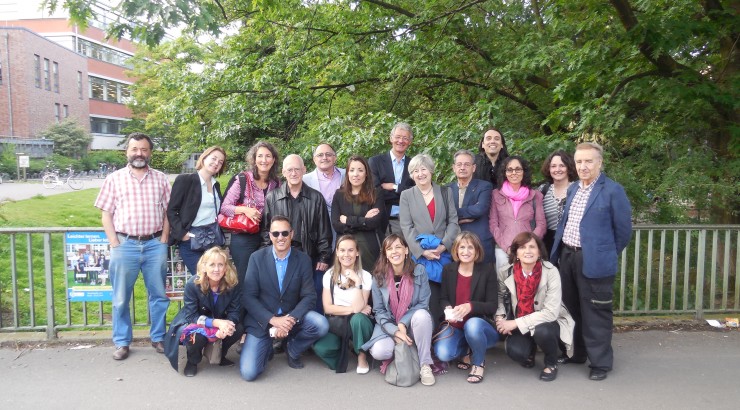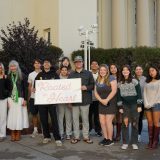Prof. Polly Hodge Participates in Colloquium on Spanish Theater…in Münster, Germany?
July 23, 2014
Written by Professor Polly Hodge
What? That’s right, a symposium on Spanish theater titled, Espacios urbanos en el teatro español de los siglos XX y XXI (Urban Spaces in 20th and 21st Century Spanish Theater) took place in Münster, Germany June 26-30, 2014 with all proceedings conducted in Spanish. Organized by Dr. Cerstin Bauer-Funke at the Westfälische Wilhelms-Universität, Münster, approximately 25 researchers and playwrights from Spain, France, Germany and the United States were invited to participate in this special seminar and I was counted among the distinguished speakers. When I received the invitation to participate by email in the spring of 2013, I almost unwittingly deleted the message since the title line suggested propaganda. However, as I read the entire message I became aware that it was a very prestigious offer and wondered, “How did this Professor Cerstin Bauer-Funke at a university in Germany even get my name?” She told me later that she did a search on the internet looking for international scholars with the appropriate credentials.
My research, publications and edited volumes on contemporary Spanish theater made me an ideal candidate for this symposium. It was a great honor to have been chosen to interact with such well-known critics as Eduardo Pérez-Rasilla, Mariano de Paco, Virtudes Serrano, Wilfried Floeck, to name a few. These names may not mean much to the average person, but I have been reading their books and articles on Spanish theater since I was a graduate student in the late eighties and early nineties. It was also enriching to engage in dialogue with playwrights Jesús Campos, Diana de Paco and José Manuel Corredoira. For me, this trip was the professional opportunity of a lifetime!
The topic of urban spaces and theater sparked my interest in looking at Madrid’s subway and it’s representation on stage. My presentation, “El metro en el teatro y el teatro en el metro: un escenario laberíntico de múltiples velocidades” examines the representation of Madrid’s metro in plays by three different playwrights: Paloma Pedrero, Luis Miguel González Cruz, and Carlos Buero. The essay will be expanded into a book chapter to be included in a special volume on Spanish theater and urban spaces.
In addition, since I studied two years of German many years ago, a secondary challenge on this trip was to see how well I could navigate using my broken, elementary, long-lost German skills. After the conference I visited a variety of cities in Germany including Berlin, Leipzig and Düsseldorf. I have to sadly admit that my arm gestures and facial expressions were more effective means of communication than my pronunciation of words in German. C’est la vie! Luckily, most Germans speak English better than I speak German. But, I understood the language much more than I could communicate with it. At least I tried and had great fun at the same time.
As I was waiting for a connecting train to take me to Berlin, I was unsure of which one to get on since they come and go so quickly by the platform. I heard a group of Spaniards, unrelated to my conference friends, talking nearby. A familiar language!! I showed them my ticket and asked them if they thought I was waiting in the right place. They pointed me in the right direction. Bravo!…..Thank goodness for my Spanish skills in Germany. These types of international and professional encounters showcase globalization at its best!
Please visit here or here for more information on the symposium in Münster.


